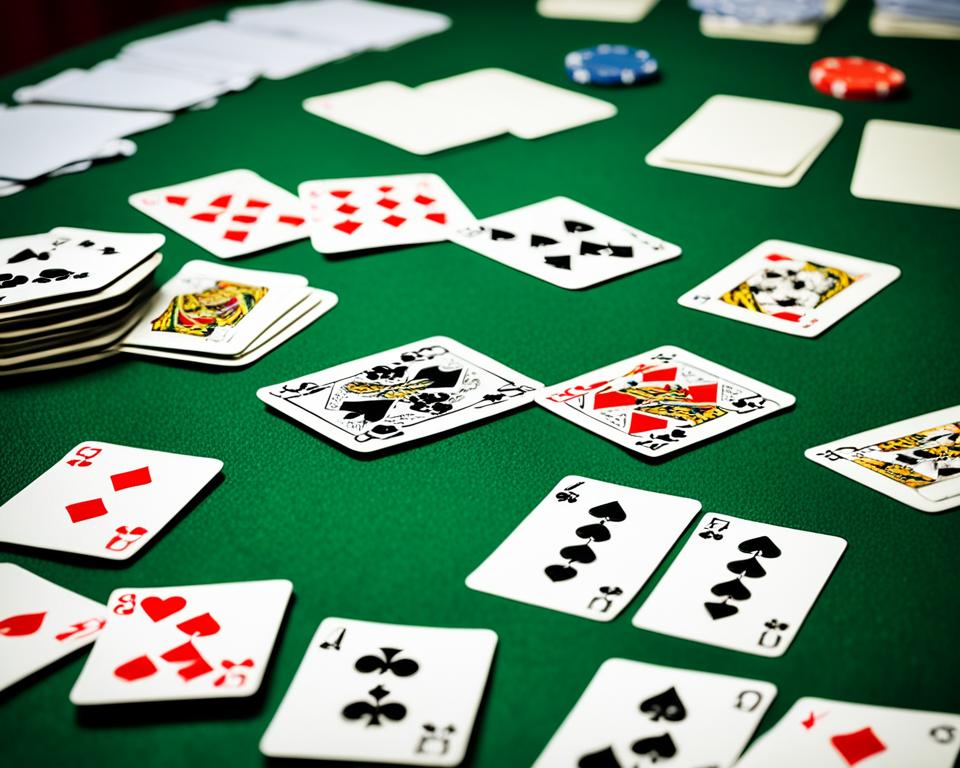Welcome to the Beginner’s Guide: Win at Blackjack Easily. If you’re a novice player looking to improve your blackjack skills and increase your chances of winning, you’ve come to the right place. In this guide, we will provide you with essential strategies and tips to help you navigate the game with confidence.
Blackjack is a popular casino game that combines strategy and probability. By familiarizing yourself with the right approaches, you can enhance your gameplay and maximize your chances of beating the dealer. Whether you’re playing at a land-based casino or an online platform, these tips and strategies will give you a solid foundation to start your blackjack journey.
So, let’s dive into the world of blackjack strategies, beginner blackjack tips, and everything you need to know to win at blackjack!
Key Takeaways:
- Learn and play basic strategy to reduce the house edge and increase your chances of winning.
- Avoid making insurance bets as they have a high house edge and are not recommended for beginners.
- Pay attention to the dealer’s up card as it can influence your optimal playing strategy.
- Choose a strategic seating position that allows you sufficient time to analyze the game.
- Start with small bets to manage your bankroll and gain experience without risking too much.
Play Basic Strategy
To increase your chances of winning at blackjack as a beginner, it is essential to learn and play basic strategy. Basic strategy involves understanding the correct decisions to make based on the value of your hand and the dealer’s up card. By following this strategy, beginners can significantly reduce the house edge and improve their overall gameplay.
Basic strategy provides clear guidelines on when to hit, stand, split pairs, and double down. These decisions are based on mathematical calculations and probabilities, ensuring players make the most advantageous moves during the game. Learning and applying basic strategy allows beginners to play blackjack with greater confidence and strategic thinking.
Whether you are playing at a brick-and-mortar casino or an online platform, basic strategy remains the foundation for success in blackjack. By understanding the rules and implementing the correct moves, players can enhance their gameplay and potentially achieve more favorable outcomes.
Basic Strategy Chart:
Refer to the table below for a quick reference to basic strategy, outlining the recommended actions based on your hand and the dealer’s up card:
| Player’s Hand | Dealer’s Up Card (2-9) | Dealer’s Up Card (10-Ace) |
|---|---|---|
| Hard Total 5-8 | Hit | Hit |
| Hard Total 9 | Double if the dealer has 3-6, otherwise Hit | Hit |
| Hard Total 10 | Double if the dealer has 2-9, otherwise Hit | Hit |
| Hard Total 11 | Double if the dealer has 2-10, otherwise Hit | Hit |
| Hard Total 12 | Hit | Stand |
| Hard Total 13-16 | Stand | Stand |
| Hard Total 17 or higher | Stand | Stand |
| Soft Total 13-15 | Hit | Hit |
| Soft Total 16-18 | Double if the dealer has 4-6, otherwise Hit | Double if the dealer has 2-6, otherwise Hit |
| Soft Total 19 or higher | Stand | Stand |
| Pairs (2-2, 3-3, 6-6, 7-7, 9-9) | Split if the dealer has 2-7, otherwise Hit | Split if the dealer has 2-9, otherwise Hit |
| Pairs (4-4) | Hit | Hit |
| Pairs (5-5) | Double if the dealer has 2-9, otherwise Hit | Double if the dealer has 2-9, otherwise Hit |
| Pairs (8-8, Ace-Ace) | Split | Split |
| Pairs (10-10) | Stand | Stand |
Remember, playing basic strategy is not a guarantee of winning every hand, but it does offer the best statistical advantage over time. By consistently applying basic strategy, beginners can improve their gameplay and make more informed decisions throughout their blackjack journey.
Avoid Insurance Bets
When it comes to playing blackjack, beginners should steer clear of making insurance bets. This additional bet is offered when the dealer’s up card is an Ace. However, insurance bets have a high house edge and are not recommended for beginners who are looking to maximize their chances of winning. Instead, it’s crucial to focus on playing the main hand and following basic strategy to increase the likelihood of success.
Insurance bets can seem tempting, as they promise to protect players in case the dealer has a blackjack. However, statistically speaking, taking insurance is not a smart move in the long run. The house edge for insurance bets is typically much higher compared to regular bets, which makes them a risky choice for beginners.
By focusing on the main hand and sticking to basic strategy, beginners can make more informed decisions and improve their chances of winning. Basic strategy is a set of rules that guides players on when to hit, stand, split, or double down based on their hand and the dealer’s up card. Following these rules, rather than relying on insurance bets, can help beginners build a solid foundation and become more proficient in the game.
Remember, gambling is a game of odds and probabilities, and insurance bets are not a foolproof way to win. It’s essential to understand the underlying principles of blackjack and use strategies that have been proven to be successful. Insurance bets may seem enticing, but they often lead to unnecessary losses in the long run. By avoiding insurance bets and instead focusing on playing the main hand and following basic strategy, beginners can increase their chances of coming out on top at the blackjack table.
Pay Attention to the Dealer’s Up Card
Before making any playing decisions, beginners should carefully observe and analyze the dealer’s up card. The value of the dealer’s up card can greatly influence the optimal playing strategy for the player’s hand. By paying attention to the dealer’s up card, beginners can make more informed decisions and increase their chances of winning.
When the dealer’s up card is a low-value card (2 to 6), it indicates that the dealer has a higher probability of busting. In this case, players may choose to play more conservatively, avoiding risky moves like hitting on hands with a total value of 12 or higher. This strategy seeks to let the dealer bust rather than risking going bust themselves.
On the other hand, when the dealer’s up card is a high-value card (7 to Ace), it suggests a stronger hand. Players should be more aggressive in this situation, aiming to improve their own hand by hitting or doubling down, especially when holding a total value of 11 or lower. The goal is to beat the dealer’s potentially strong hand by increasing the chances of obtaining a higher total without going bust.
By closely monitoring the dealer’s up card, beginners can adapt their playing strategy accordingly, maximizing their potential for success in each hand. Remember, the dealer’s up card provides valuable information, giving players an edge in making strategic decisions.
Example:
“I always pay close attention to the dealer’s up card before deciding how to play my hand. If the dealer shows a 5, I know they have a weak hand, so I play it safe and stand on my 14. But if the dealer’s up card is a 10, I’m more inclined to hit my 12 because there’s a higher chance that the dealer has a stronger hand. It’s a small but crucial detail that can greatly impact my chances of winning.” – Blackjack Player
By understanding the significance of the dealer’s up card, beginners can sharpen their decision-making skills and improve their overall blackjack performance.
Choose a Strategic Seating Position
When playing blackjack, beginners should give some thought to their seating position at the table. The placement can have an impact on their ability to make decisions and analyze the game effectively. Sitting in the first base seat, which is closest to the dealer, may not always be advantageous for beginners. This position allows less time to review the hand and the dealer’s up card, limiting the opportunity to make informed choices.
Instead, it’s recommended for beginners to choose a seat further down the table. Sitting towards the end of the table provides more time to observe the dealer’s up card, evaluate the other players’ actions, and strategize accordingly. This additional time can be crucial in making better decisions and increasing the chances of winning.
By strategically choosing a seat further down the table, beginners can enhance their overall blackjack experience and improve their chances of success.
Start with Small Bets
When venturing into the world of blackjack as a beginner, it’s crucial to start with small bets. This strategic approach allows beginners to assess the table dynamics, observe the dealer’s tendencies, and evaluate their own performance without risking a significant portion of their bankroll. By starting small and gradually increasing the bets as confidence grows, beginners can ensure a measured approach to the game.
Starting with small bets serves two important purposes. Firstly, it allows beginners to familiarize themselves with the rules and intricacies of the game without experiencing substantial losses. This gradual learning process provides an opportunity to develop a solid foundation of knowledge and skills before taking bigger risks.
Secondly, starting with small bets helps manage potential losses effectively. It is natural for beginners to make mistakes or encounter some setbacks along the way. By keeping the bets small, beginners can limit their losses, preserving their bankroll for more favorable situations.
Moreover, small bets prevent overexposure to the game. In the early stages of blackjack play, beginners may lack experience and confidence. Placing large bets right away could lead to unnecessary stress and potentially deter beginners from continuing their journey. By starting small, beginners can gradually build their confidence and comfort level, ensuring a more enjoyable and rewarding experience.
Remember, blackjack is a game that requires strategy and patience. Starting with small bets allows beginners to focus on understanding the game’s nuances, practicing blackjack bankroll management techniques, and progressively improving their skills. It’s not about chasing big wins right from the start, but rather about building a strong foundation for long-term success.
Take a look at the image below to see the importance of starting with small bets in managing your blackjack bankroll:

The Impact of Starting with Small Bets on Bankroll Management
| # of Bets | Bet Size | Total Amount Wagered | Bankroll | Percentage of Bankroll Wagered |
|---|---|---|---|---|
| 10 | $5 | $50 | $200 | 25% |
| 10 | $10 | $100 | $200 | 50% |
| 10 | $20 | $200 | $200 | 100% |
As shown in the table above, starting with smaller bets allows players to wager a smaller percentage of their bankroll, providing a more sustainable approach to bankroll management. By gradually increasing bet sizes as their bankroll grows, players can maintain control and mitigate the risk of significant losses.
Don’t Believe in Gambler’s Myths
When it comes to playing blackjack, beginners should be aware of the many myths and superstitions that circulate around the game. It’s important to remember that these myths have no basis in reality and should not influence your playing decisions. The outcome of your hand is determined by the cards you are dealt and the strategies you employ, not by the actions of other players or the so-called “lucky charms” they might possess.
To maximize your chances of winning, it’s crucial to focus on the fundamentals of the game and follow proven winning techniques. This includes playing the correct game, following the basic strategy, and making decisions based on the value of your own hand and the dealer’s up card. By sticking to these strategies, you can make informed choices that are based on logic and probability, rather than relying on false beliefs or superstitions.
Remember, blackjack is a game of skill and strategy, not luck or superstition. By employing sound techniques and tactics, you can improve your odds of winning and minimize your losses. Be confident in your abilities and trust in your knowledge of the game. With practice and perseverance, you can become a successful blackjack player and enjoy the thrill of victory at the tables.
Now that you know the importance of disregarding gambler’s myths and superstitions, let’s move on to the next section and explore another essential aspect of winning at blackjack.
Set a Loss Limit
To protect their bankroll and practice responsible gambling, it is crucial for beginners to set a loss limit before starting a blackjack session. By establishing a predetermined limit, players can prevent excessive losses and make informed decisions about when to walk away from the table.
Setting a loss limit helps beginners avoid the common pitfall of chasing losses, where players continue to play in hopes of recovering their previous losses. This mindset can lead to further losses and potential financial hardship.
By determining a loss limit in advance, players have a clear guideline for how much they are willing to risk and can exit the game when they reach that limit. It is essential to view blackjack as entertainment and not rely on it as a source of income.
“Setting a loss limit is a fundamental aspect of blackjack bankroll management. It allows players to maintain control over their finances and gamble responsibly.”
When setting a loss limit, beginners should consider their overall bankroll and only wager an amount that they are comfortable losing. This will ensure that the blackjack experience remains enjoyable and does not have a negative impact on their financial well-being.
By adhering to a loss limit, beginners can approach blackjack with a strategic and mindful mindset. They can focus on the game itself, make informed decisions, and enjoy their time at the table without the stress of chasing losses or risking more than they can afford.

Bankroll Management Tips for Beginners
- Set a realistic loss limit based on your bankroll.
- Stick to your predetermined limit and avoid exceeding it.
- Track your wins and losses to keep a clear record of your progress.
- Avoid chasing losses and resist the temptation to increase your bets out of frustration.
- Consider starting with a smaller bankroll until you gain more experience.
By following these bankroll management tips, beginners can enjoy the game of blackjack while keeping their financial well-being in check. Remember, responsible gambling is always a priority.
| Bankroll Amount | Loss Limit (10% of Bankroll) |
|---|---|
| $500 | $50 |
| $1,000 | $100 |
| $2,500 | $250 |
Practice Card Counting (Optional)
For more experienced players, card counting can be a powerful technique to gain an advantage in blackjack. Card counting involves keeping track of the cards that have been dealt to estimate the ratio of high cards to low cards remaining in the deck. By doing so, players can adjust their betting and playing decisions accordingly, maximizing their potential winnings.
Card counting can be a complex skill that requires practice and a keen attention to detail. It is not recommended or necessary for beginners, as it requires a deep understanding of the game and the ability to maintain focus in a fast-paced casino environment. However, for those who are willing to put in the time and effort to learn card counting, it can greatly enhance their chances of winning.
It’s important to note that while card counting is legal, casinos frown upon it. If caught counting cards, players may be asked to leave the casino. Therefore, it’s crucial to be discreet and avoid drawing attention to oneself. Additionally, card counting is most effective in games with a high number of decks and favorable rules.
While card counting can be a valuable tool in the hands of experienced players, it should not overshadow the importance of employing basic strategy and other winning techniques. It’s essential to have a solid foundation in the fundamental strategies of blackjack before attempting to incorporate card counting into gameplay.
“Card counting allows skilled players to tilt the odds in their favor, but it is not a magic bullet. Success still requires discipline, perseverance, and a deep understanding of the game.”
Remember, the goal of card counting is not to predict the exact cards that will be dealt but rather to make informed decisions based on the probability of certain cards being drawn. It’s a technique that requires mental agility and quick calculations, making it more suitable for players who are experienced and comfortable with the game.
The High-Low Card Counting System
One of the most popular card counting systems is the High-Low system. It assigns a value of +1 to low cards (2-6), a value of 0 to neutral cards (7-9), and a value of -1 to high cards (10-Ace). By keeping a running count of these values as the cards are dealt, players can estimate the overall count of high cards remaining in the deck.
Below is a table illustrating the point values assigned to each card:
| Card | Value |
|---|---|
| 2, 3, 4, 5, 6 | +1 |
| 7, 8, 9 | 0 |
| 10, J, Q, K, A | -1 |
By keeping track of the running count and converting it into the true count by considering the number of decks remaining, players can adjust their bets and playing decisions accordingly. A positive true count indicates a higher proportion of high cards, which is favorable for the player, while a negative true count suggests a higher proportion of low cards, favoring the dealer.
It’s important to note that card counting is a skill that requires practice and dedication. It’s not a guaranteed way to win every hand, but it can significantly increase your chances of success in the long run. If you are interested in learning more about card counting, there are numerous resources available, including books, online tutorials, and practice drills.
Always remember to gamble responsibly and within your means. Winning at blackjack is not solely dependent on card counting, but also on proper bankroll management, strategic decision-making, and a bit of luck.
Conclusion
Winning at blackjack for beginners is within reach by following the strategies and tips outlined in this guide. By utilizing basic strategy, understanding the dealer’s up card, selecting a strategic seating position, starting with small bets, and maintaining responsible bankroll management, beginners can significantly improve their chances of success. Although card counting is an advanced technique, it is not a necessity for beginners to achieve victory in blackjack. With dedication and practice, beginners can become proficient in the game, ultimately enhancing their chances of winning.
By adhering to basic strategy, beginners can make optimal decisions in terms of hitting, standing, splitting, and doubling down, based on their hand and the dealer’s up card. This knowledge helps reduce the house edge, increasing the likelihood of achieving favorable outcomes. Observing and analyzing the dealer’s up card provides insights into the optimal playing strategy, enabling beginners to make more informed decisions.
Choosing a strategic seating position, such as a seat further down the table, allows beginners more time to review their hand and the dealer’s up card before making important decisions. Starting with small bets not only allows beginners to acclimatize to the dynamics of the game but also ensures responsible bankroll management and mitigates the risk of substantial losses early on.
While card counting can be an optional technique for experienced players to gain an advantage, beginners need not focus on this complex skill to achieve success. By implementing the strategies and tips presented in this guide, beginners can pave the way for a rewarding blackjack experience and increase their chances of winning.
FAQ
What is basic strategy in blackjack?
Basic strategy in blackjack involves knowing the correct way to play your hand based on its value and the dealer’s up card. It is the foundation for maximizing your chances of winning.
Should beginners make insurance bets in blackjack?
No, insurance bets have a high house edge and are not recommended for beginners. It is better to focus on playing the main hand and following basic strategy.
Why is it important to pay attention to the dealer’s up card?
The dealer’s up card can influence the optimal playing strategy for your hand. By analyzing the dealer’s up card, you can make more informed decisions.
Does the seating position at the blackjack table matter?
Yes, the seating position can affect your decision-making process. Choosing a seat further down the table allows you more time to make decisions and analyze the game.
Should beginners start with small bets?
Yes, starting with small bets allows beginners to learn the game dynamics, dealer tendencies, and manage losses effectively without risking a large bankroll.
Do gambler’s myths and superstitions affect the outcome of a blackjack game?
No, the decisions and actions of other players at the table have no impact on the outcome of your hand. It is best to focus on playing the correct strategy based on your own hand and the dealer’s up card.
What is a loss limit in blackjack?
A loss limit is a pre-determined amount of money that you are willing to lose in a blackjack session. Setting a loss limit helps protect your bankroll and prevents excessive losses.
Should beginners practice card counting in blackjack?
Card counting is an optional advanced technique that can give players an advantage in blackjack. However, it is not necessary or recommended for beginners. Focus on mastering basic strategy first.
How can beginners win at blackjack?
By playing basic strategy, paying attention to the dealer’s up card, choosing a strategic seating position, starting with small bets, and practicing responsible bankroll management, beginners can increase their chances of winning.





